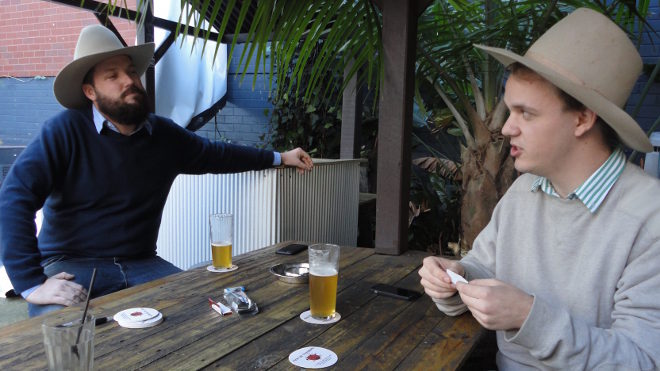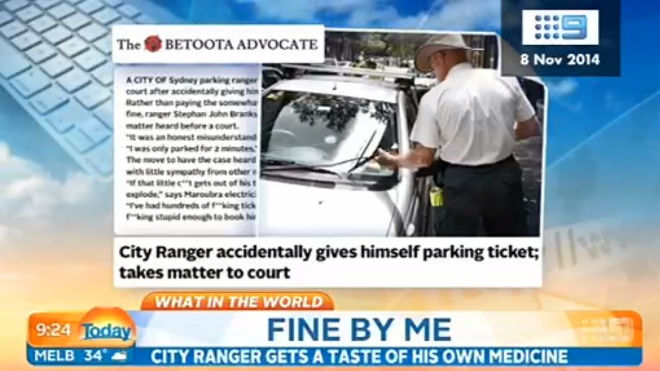Stranger Than Fiction: The State Of Australia’s Online Satire
We spoke to the teams behind The Betoota Advocate, The Sauce, The Shovel and The Stringer Daily.
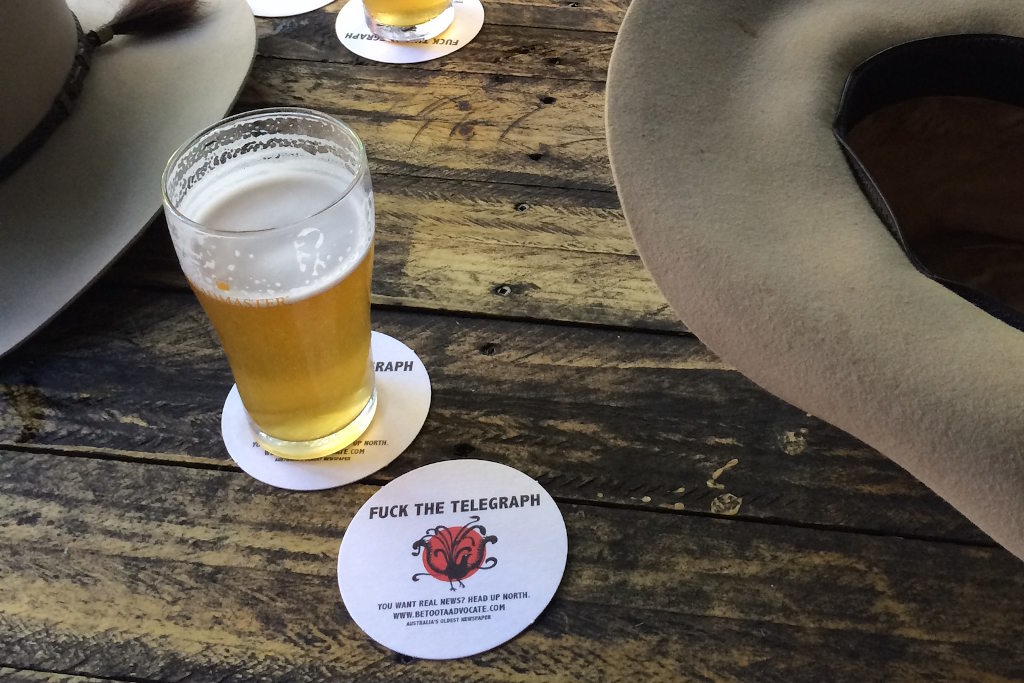
Clancy Overell and Errol Parker are both editors at Australia’s oldest newspaper. The pair sit at a wooden table in the courtyard of Sydney’s Alexandria Hotel. They rest their Akubra hats on the tabletop, and their beers on coasters which they’ve brought from home. On the coasters are the words, “FUCK THE TELEGRAPH. YOU WANT REAL NEWS? HEAD UP NORTH. THE BETOOTA ADVOCATE.”
“I’m a 63-year-old career journalist, born and raised in the Queensland Channel Country,” Clancy says with a rural Aussie drawl, palming his thick beard. Errol quietly mentions he’s in his forties, but both men look about ten years younger than that. Their iPhones ping with Facebook Messenger and Instagram notifications. Clancy Overell and Errol Parker are not their real names.
“My family has been involved in The Betoota Advocate since well before I was born,” Clancy continues. “I was a sports reporter for a while, and I took a ten-year sabbatical at one point to join Jimmy Sharman’s boxing troupe. They were my days as a tent boxer — Dancin’ Clancy Overell they used to call me.”
Errol remains quiet. He says he studied journalism before working as a reporter in Canberra for Fairfax Media. He says he took a redundancy in 2011, “when the share price went arse up”, before moving to London for a few years. He returned home and met Clancy in a two-up circle on Anzac Day 2012, he says, before finding his place at The Betoota Advocate in a part-time capacity.
“It’s a semi-retirement we live in,” Clancy says, as Errol smokes a rollie. “I get into a bit of fencing, I’m still working on the land, and Errol’s a keen clay pigeon shooter.”
It’s all a joke, of course; the duo are satire personified.
What Is The Betoota Advocate?
Unlike most of the country’s other satirical sites, The Betoota Advocate allows the falsehoods of satire to seep into the public personas of its two head honchos. It’s a technique which the publication pulls off with relative ease, and which shapes how it responds when its stories are mistakenly read as real news.
In November 2013, The Betoota Advocate published a story headlined, ‘City Ranger accidentally gives himself parking ticket; takes matter to court’. The article reported that City of Sydney parking ranger Stephan John Branks had elected to take his self-imparted $104 fine to court, rather than pay it. A local electrician, Peter Mortlocke, is quoted by The Betoota Advocate saying, “If that little cunt gets out of his ticket, I’ll fucking explode.”
The Betoota Advocate’s scoop was gleefully run by Channel Nine’s Today Show as a legitimate story. ‘Fine By Me: City Ranger Gets A Taste Of His Own Medicine,’ read the banner over the Today Show’s broadcast. The Betoota Advocate’s response to this unforgivable gaffe was, of course, in keeping with its lead characters, and came in the form of an open letter to Nine Entertainment Co. and ABC’s Media Watch program.
“We pride ourselves on reporting fair and just news with authenticity that rivals only the salt on the sunburnt earth that surrounds us here in the Channel Country,” wrote Overell and Parker. “This story was ripped and stripped by the Today Show and published as their own. This is ‘Churnalism’. This is plagiarism.”
According to Clancy, ‘churnalism’ isn’t rare. “When it happens, you feel powerful beyond measure,” he laughs, briefly pulling out from behind his persona. “We get plenty of contact from people who want our sources, and we string them along as far as we can.”
Facebook’s War Against [Satire]
Beginning in August 2014, Facebook briefly tested a new feature which warned users of satirical news stories. After receiving feedback from people who had clearly confused real new stories with fake ones, Facebook began placing [Satire] tags at the beginning of headlines from satirical websites such as The Onion, ClickHole and The Daily Currant, whose stories are routinely shared by thousands on social media.
After Facebook began its [Satire] tag test, The Onion responded with a news article titled ‘Area Facebook User Incredibly Stupid’. Melbourne-based satire website The Shovel published its own tongue-in-cheek story, titled, ‘Facebook Announces New ‘Boring’ Tag For Boring News Feed Items’.
The Shovel’s James Jericho says the site doesn’t set out to trick people into believing its headlines, but admits misunderstandings are inevitable. “That’s always going to happen,” Jericho says. “Satire works best when people are in on the joke, and when the joke skirts close enough to the truth that it’s a little uncomfortable.”
Things can, and do, get a little too uncomfortable. Cameron Smith, the 26-year-old insurance company employee behind Sydney-based satirical news website The Sauce, has seen some of his work almost become a threat to national security.
On 30th December 2014, just prior to New Years Eve celebrations, Smith published a story titled, ‘Police Find Thousands Of Explosives Rigged To Sydney Harbour Bridge’. “The whole joke was that the explosives were the fireworks, but a lot of people freaked out,” he explains. “It went completely nuts. The site crashed, so nobody could get to the article to see it was a joke. We ended up having to put a tag on the article saying, ‘This is satire, you idiots,’ and people were still sharing it around and freaking out.”
A handful of right-wing groups, such as Local Terror Exposed, shared Smith’s Harbour Bridge story online, while others even declared the power of their God after the supposed bomb plot was foiled. “It caused a minor terrorist scare,” he says, “but apart from that it was good.”
There was a similar case in November last year, when a satirical article about the anti-halal movement was published by SBS’ The Backburner, provoking outrage from the movement itself. “It’s really worrying what people will believe,” Smith says.
Facebook haven’t released any results from their [Satire] tag test, or announced their plans for the feature, but it’s clear that they don’t mind ruining punchlines by warning readers to brace for impact.
In January this year, the platform updated its News Feed algorithm so that users will see less hoaxes and scams. The company says the update won’t affect links to stories containing “satirical content intended to be humorous, or content that is clearly labelled as satire”. So if satire isn’t clearly labelled as such, it might just come down who thinks a story is funny, who thinks it isn’t, and who just doesn’t get the joke.
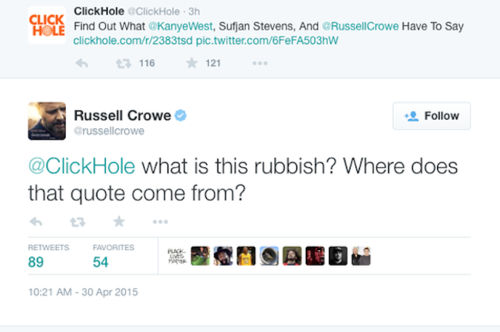
What Good Satire Looks Like
It’s difficult to predict the kinds of reactions a satirical news story will receive. That’s what makes the format so risky — and satirical news reporters are revelling in that risk. In February 2013, Australian site The Stringer Daily published a news story covering the death of Healthy Harold, a fictional giraffe used as a mascot for health education in Australian primary schools: ‘Happy Healthy Harold overdoses on benzodiazepine, heroin’. Harold was reported to have had a long-term ice addiction, with his last words quoted as, “I bet you never thought you’d see me like this! I’ve never used a condom in my life!”
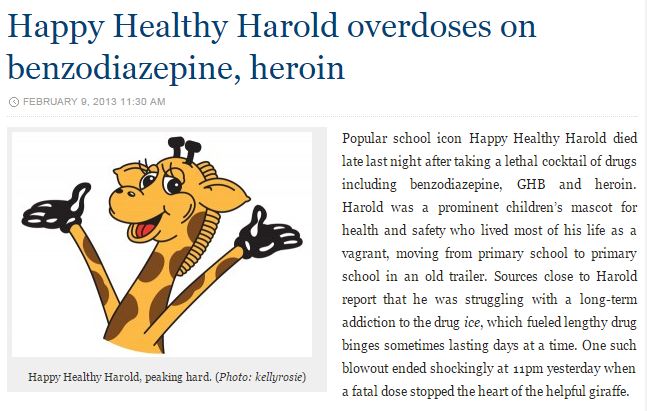
Luke McCormick (not his real name) runs The Stringer Daily, and penned the tragic story of Healthy Harold’s demise. The 25-year-old Sydneysider splits his time between stand-up comedy, satirical news and a job in the legal industry; he calls the article “silly”, but makes it clear he’s aware of the risks.
“Unsurprisingly, the charity that looks after Healthy Harold got onto me and tried to get me to take the story down,” McCormick says. “I decided to keep it up, though. The way I saw it, Harold is a fake giraffe. It was clearly a joke and it wasn’t hurting anyone.
“A lot of articles that get shared on social media and are seen by people who haven’t heard of The Stringer Daily will inevitably get some outraged comments from people who don’t get that it’s a joke.”
So why are people writing satirical news stories if readers’ reactions are so unpredictable? “A good piece of satire can sum up in one headline what a piece of straight reporting might take 800 words to get across,” says The Shovel’s James Jericho. “It’s short, sharp, fun and shareable.”
The absurd headlines and uncomfortable jokes of satirical news are being pulled into the realm of “real news” by gullible readers and media organisations, but are also being embodied by characters like Clancy Overell and Errol Parker, who have, themselves, become the joke. As The Sauce’s Cameron Smith puts it, “The Betoota Advocate are making people make idiots of themselves by presenting themselves as a cliché.”
Errol Parker prepares another rollie, before eloquently explaining the true value of satirical news in a media-saturated world. “It’s news that is more approachable to the average bloke,” he says. “It makes it easier to consume — like if the news was a digestive biscuit.” Clancy Overell hands me a stack of 11 “FUCK THE TELEGRAPH” coasters to keep, and orders another round of beers.
–
Tom is a Sydney journalist and music snob. He writes for Music Feeds and CraveOnline Australia, and has contributed to FasterLouder, the AU review and New Matilda. He tweets from @tom__williams
